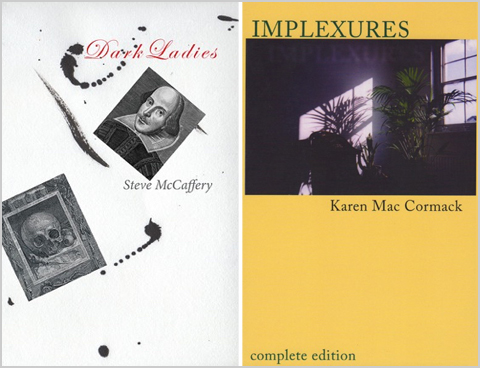Join us for a reading from acclaimed poets Steve McCaffery and Karen Mac Cormack. Steve will read from Dark Ladies, an explosive meditation on death and laughter cast as both a Menippean masque and a user’s guide to the tragi-comic. Karen will read from various works, including Implexures.

Steve McCaffery has been twice nominated for the Governor General’s Award and is twice recipient of the Gertrude Stein Prize for Innovative Writing. He is the author of over 40 books and chapbooks of poetry and criticism. An ample selection of his poetic explorations in numerous forms can be savoured in the two volumes of Seven Pages Missing (Coach House Press). As well as Panotpicon, Tatterdemalion (Veer Books UK), Alice in Plunderland (Book Thug), Revanches (Xexoxial), and Parsival (Rook). His book-object-concept A Little Manual of Treason was commissioned for the 2011 Shajah Biennale in the United Arab Emirates. A founding member of the sound poetry ensemble Four Horsmen, TRG (Toronto Research Group) and the College of Canadian Pataphysics and long-time resident of Toronto, he is now David Gray Professor of Poetry and Letters at the University at Buffalo.
Karen Mac Cormack (born Luanshya, Zambia, 1956) is a contemporary experimental poet. She holds dual British/Canadian citizenship, and lived for many years in Toronto; more recently, she moved to Buffalo, New York, when her husband, the poet Steve McCaffery, was hired by SUNY-Buffalo for the David Gray Chair. Mac Cormack is the author of Straw Cupid (1987), Quirks & Quillets (1991), Marine Snow (1995), The Tongue Moves Talk (1997), At Issue (2001), Vanity Release (2003) and Implexures (part one, 2003; full-length publication, 2009), as well as a collaboration with the British poet Alan Halsey, Fit to Print (2003). Though she was not directly part of the Language movement, her work shows many affinities with it, in its use of disjunctiveness at a within-sentence and between-sentence level, and in her interest in the interrogation of cultural norms and ideologies through the skeptical reworking of “found” materials and genres. In Fit to Print, for instance, the poems mimic and distort the format and themes of a typical daily newspaper, while in At Issue the poems are quarried from the pages of women’s fashion and beauty magazines. The prose pieces in the recent project Implexures are somewhat atypical in their use of biographical and autobiographical materials, especially a series of letters written from a variety of Mediterranean locations by an unnamed female traveller (possibly to be identified with the author, possibly not).
